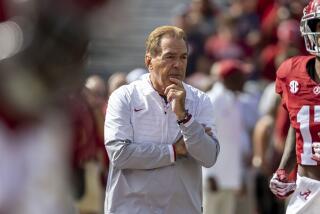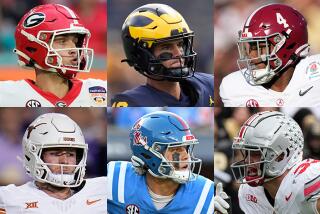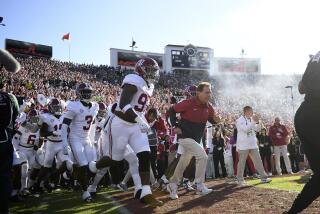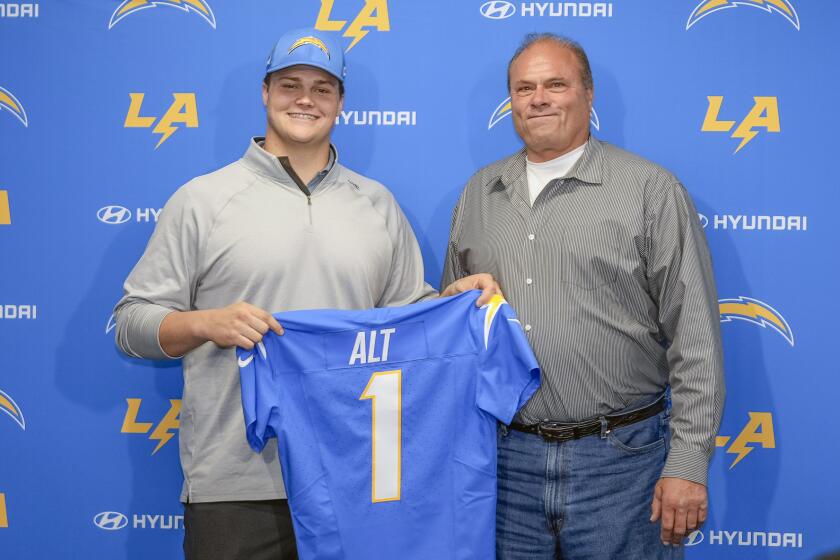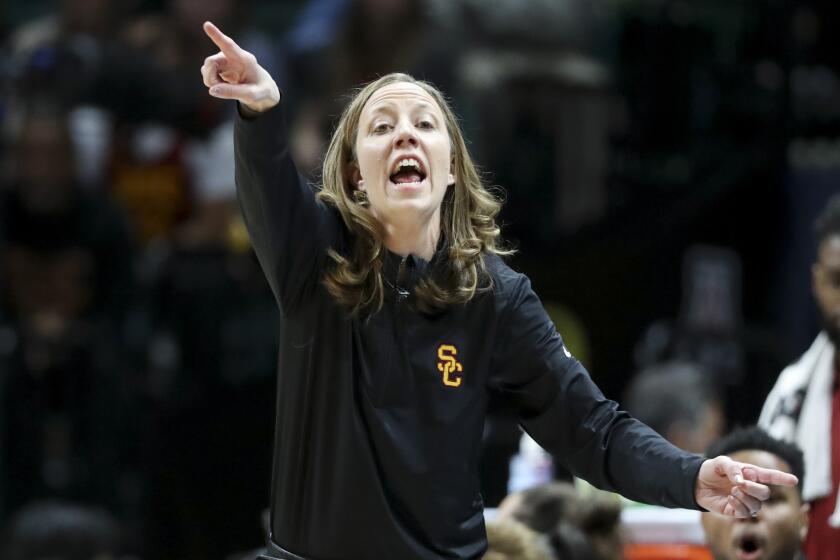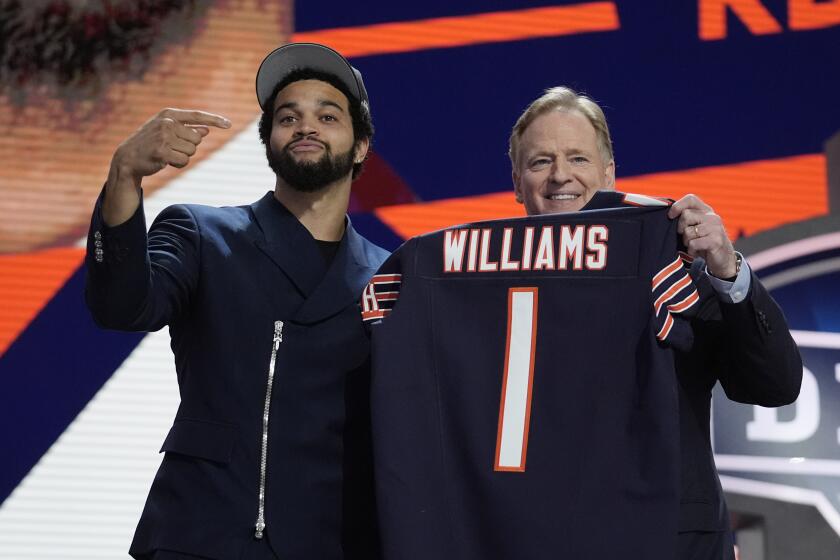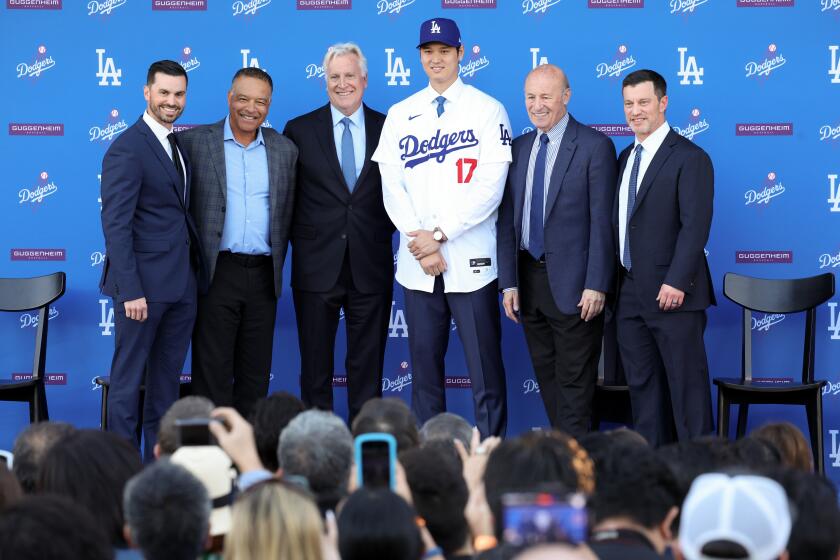Alabama, No. 1 in preseason football rankings, a healing force in Tuscaloosa
From Tuscaloosa, Ala. — Cecil Hurt agreed to drive the rental through the tornado zone. It was his town. These were his tears.
His daddy played football in the 1950s for “Ears” Whitworth, famous now only for being Alabama’s coach before Bear Bryant.
Hurt is a sports columnist for the Tuscaloosa News, but what ripped through his city April 27 made everyone chroniclers, first responders and teammates.
The tornado struck shortly after 5 p.m. and roared, a mile wide in some spots, four miles from the city’s southwest corner to its northeast tip.
Hurt watched it touch down from his porch. With no basement shelter, he ran to the hallway and held on for dear life. It sounded, like almost everyone says, like a freight train. The twister uprooted four trees at Hurt’s home, but the nails in his roof won a heroic battle against the updraft.
Others weren’t so lucky. The Tuscaloosa death toll was recently raised to 50.
Like a zombie, Hurt walked into the street and began assessing the damage.
Half of Rosedale Court was wiped out.
Three months later he took a visitor around.
“If you were in the funnel right here,” Hurt said as he slowed the car, “it blew up your house. It just blew up your house.”
He drove past what used to be a lakeside community, stopping at a pile of roadside rubble.
There was no reason to speak.
His voice catching every now and then when he did have something to say, Hurt maneuvered down McFarland Boulevard and pointed to a portable trailer sitting on a cement slab.
“That,” he said, “was the Krispy Kreme.”
At one point along the pitiful path, anticipating a question, Hurt said, “From here to Nick Saban’s office is six blocks.”
Saban is head football coach at Alabama and, inarguably, the most famous person in the state.
Somehow — thankfully, mercifully — the campus and Bryant-Denny Stadium were spared. Alabama’s players were all accounted for, although walk-on snapper Carson Tinker was seriously injured after being thrown 50 yards from his home. Ashley Harrison, his girlfriend, died.
The fine line between Alabama not fielding a football team this year and Alabama being The Times’ preseason No. 1 is the arbitrary variance of a compass degree.
Post-tornado life in Tuscaloosa is bad enough. Life without football would have been intolerable. In a state with no major professional sports, college football is the fulcrum of recovery.
“Lots of people lost everything,” Crimson Tide safety Mark Barron said. “They lost material things, but they also lost hope. When the season starts, they follow Alabama, so if we go out and have a great season for them, we can give them a little something back.”
Saban might be college football’s least touchy-feely coach, but this tornado transformed him.
He bristles that anybody would deem Alabama No.1 when all he can think about is replacing his starting quarterback and star receiver and dealing with the myriad distractions that come with hands-on disaster relief.
Not long after the tornado, tragedy struck home again when Crimson Tide offensive lineman Aaron Douglas died from what the medical examiner said was an accidental drug overdose.
Everyone looked to see how the state’s most important citizen responded in crisis. Saban led with his usual square-jawed, laser-beam focus. He has spearheaded the recovery effort. Players from Kent State, this year’s opening opponent, even came to Tuscaloosa in July to help rebuild houses.
“There’s no question that some of these things sort of put all the things we focus on, the expectations, in perspective,” Saban said during a rare quiet moment at the Southeastern Conference football media days late in July. “And it changes how you feel.
“I mean, I never had a player die before, OK? And I have a tremendous amount of respect and a completely different feeling when I walk in front of our team now. Maybe you take it for granted that they’re always going to be there, probably the same thing with your children at home if you ever lost one.”
If the tornado deposited a speck of worthwhile residual, it was tamping down emotions in a football state that had lost its bearings.
Alabama versus Auburn has always been heated. The motto of the intrastate rivalry is “it’s 365 days,” but more recently it needed a few days off.
“It really comes down to there really is nothing else to do here,” said Chadd Scott, an Auburn graduate and Atlanta-based radio host. ‘It’s not like you’ve got Dodgers, Angels, the beach, the mountains. You’ve got this. And you’ve got this year round.”
The state of Alabama, with fewer than 5 million people, has won the last two Bowl Championship Series titles. The Crimson Tide claimed the top prize two years ago, beating Texas at the Rose Bowl, and Auburn countered last year with a last-second win over Oregon in Glendale, Ariz.
“College football,” Scott said, “is what Alabama has most to be proud of. Somebody from Birmingham can go anywhere and pump their chest out about what? It’s not, ‘Wow, look at our industry, look at our business.’ It’s, ‘Hey, we’ve got college football.’ And all that leads to commitment. And if you’re committed to something, generally, you can achieve it.”
Last November’s “Iron Bowl” may have been the most enthralling in a series that dates to 1893.
Alabama blew a 24-0 lead at home and watched Auburn dance in Bryant-Denny on its way to the national championship.
“No reasonable person could have ever thought we could come back in that game,” Scott said. “It’s Kirk Gibson against the A’s, it’s whatever else you want to relate it to. It is the all-time comeback. Fifty years from now, when the story of Auburn football in this century is written, that may be No.1. … People will remember that game on the day they die.”
The aftermath, though, produced a new level of ugliness when an Alabama fan, Harvey Updyke, called Paul Finebaum’s must-hear radio show and admitted to poisoning century-old oak trees at “Toomer’s Corner,” near Auburn’s campus.
The news outraged Alabamans.
It was a first step in rivalry relief.
“Real Alabama fans hated it,” Faye Smith, an Auburn graduate, said as she waited for autographs during SEC media days. The tornado then reconnected Auburn to Tuscaloosa.
“Previous to those two events, the lunatic fringe sort of set the tenor for the rivalry, the radio callers, the name calling and the message boards,” Scott said. “The grown-ups have gotten back in charge and gone, all right, it’s a great rivalry, but it’s a football game. … Let’s put this in perspective, and not allow the Harvey Updykes and the radio callers to set the tone for how we want to be perceived nationally.”
Will it be tough for Alabama to win the national title this year?
Yes. The Crimson Tide has moved on without quarterback Greg McElroy and running back Mark Ingram — pillars from the 2009 title team.
Will it be tough to root for Alabama to win it all this year?
No.
Alabama football has a divisive component that comes from years of unparalleled success and the self-righteousness that sometimes accompanies it.
Saban is not a drippy, sentimental man who needs a hug. You can barely talk to him at all once the season starts.
Everyone, though, can appreciate Saban’s post-traumatic resolve. Everyone can wrap their arms around Tuscaloosa. No football town in America has been so devoted and destroyed.
Cheer for the porch steps on Crescent Ridge Road that used to have a house connected to them.
Root for Krispy Kreme to rebuild on McFarland Boulevard.
Allow June Lambert, an Alabama grad, to keep memories of the town she used to know.
“Every time I drive through,” she said, “my landmarks aren’t there.”
Count it a small victory that the iconic crescent moon sign at Moon Winx Lodge — for years the beacon on University Boulevard East welcoming travelers home — survived to still wink at passersby.
Pray for savaged trees to re-root on Elm Drive.
It is funny what we take for granted, Cecil Hurt said. One of his first post-tornado laments was that the town’s shade had disappeared.
Football reigns, and even rains, here.
After the tornado, Hurt found a ball in his driveway. Signed by members of 2001 Crimson Tide squad, it was soaking wet, and Hurt had no idea from where it hailed. The tornado probably plucked it from somebody’s fireplace mantle and took it on the longest punt in Alabama history.
Hurt planned to donate the ball to the Paul W. Bryant museum.
Other memories have no such repository.
“We found that,” Hurt said of the football. “And, more disturbingly, we found a baby shoe, which I’d like to think was in somebody’s closet.
“But it was tied.”
The countdown: 25. Texas; 24. Georgia; 23. Arkansas; 22. Arizona State; 21. West Virginia; 20. Auburn; 19. Ohio State; 18. USC; 17. Michigan State; 16. Florida; 15. Virginia Tech; 14. Texas A&M; 13. Texas Christian; 12. South Carolina; 11. Notre Dame; 10. Louisiana State; 9. Oklahoma State; 8. Wisconsin; 7. Nebraska; 6. Stanford; 5. Florida State; 4. Boise State; 3. Oregon; 2. Oklahoma.
More to Read
Get our high school sports newsletter
Prep Rally is devoted to the SoCal high school sports experience, bringing you scores, stories and a behind-the-scenes look at what makes prep sports so popular.
You may occasionally receive promotional content from the Los Angeles Times.
